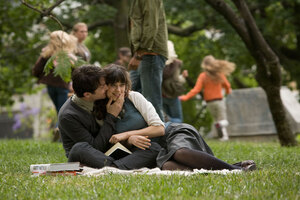Summer film fails to remain through the season

Love and war · Joseph Gordon-Levitt and Zooey Deschanel star is Marc Webb’s delightfully post-modern “(500) Days of Summer.” The film is a contemporary story about love and relationships, set entirely in Los Angeles. After screening at several film festivals, including Sundance and South by Southwest, “(500) Days of Summer” has become one of the most anticipated independent films this year. The film will be screened at the Los Angeles Film Festival this Friday, and will open Los Angeles and New York July 17. | Photo Courtesy of Fox Searchlight
“(500) Days of Summer” has all the correct ingredients for a quirky relationship film: two super-adorable actors with immeasurable amounts of spunky charisma, a hip soundtrack featuring both new and old artists with indie street cred and a refreshing tag line (“This is not a love story. This is a story about love.”) for those new-agers freshly jaded from a recent break-up.
So what went wrong?
It’s a bigger mystery than main protagonist Tom’s existential quest to figure out what exactly happened between Summer, the so-called love of his life, and him.
Unfortunately, this question lingers longer than the film’s emotional sugar rush.
“(500) Days of Summer” is truly a New Wave film for the MTV generation. Starring child star-turned-serious leading man Joseph Gordon-Levitt as Tom and every fedora-clad hipster’s dream girl Zooey Deschanel as Summer, “(500) Days of Summer” markets itself as a contemporary love story — excuse me, a story about love — for all of the 20-somethings out there currently struggling with their less than perfect love lives.
Add in the easy on the ears yet painfully self-aware compilation of The Smiths, Regina Spektor, Spoon and Black Lips, and any semi-frequent Amoeba-goer will feel like this movie was made for him or her.
True to its demographic, the film follows a pair of 20-somethings living alone in Los Angeles. One half of this pair (Tom) is searching for love, while the other half (Summer) is perfectly happy with whatever she gets. They flirt, they date, they kiss and they fight — all out of order in true post-modern fashion.
“(500) Days of Summer” is sure to propel Gordon-Levitt to a newfound heartthrob status that he hasn’t seen since his “10 Things I Hate About You” days.
Now all grown-up, though still clinging onto his clean-shaven baby face, Gordon-Levitt is funny, sensitive and heart-felt as that self-conscious guy unsure of how cool he really is.
Deschanel, sadly, has less to play in her role as the — what else? — love interest. For the first half of the film, Summer is the kick-ass 21st century woman, trading emotional attachment for her vinyl collection.
As for the film’s second half, with Tom’s love for her slowly fading away, Summer becomes less of a real character and more of an image of everything Tom hoped she would be — and wasn’t. Nonetheless, Deschanel plays her character well for what she’s given.
This image of Summer is further reinforced through the French New Wave-style editing that seems to place her on a grand pedestal. Case in point: In a roughly edited, jump cut-ridden scene, the immensely beautiful Summer lies on top of electric white sheets, smiling coyly into the camera while bright sunbeams perfectly frame her heart-shaped face.

Yeah, OK.
Most refreshing about “(500) Days of Summer” is not a drunken Gordon-Levitt performing karaoke to the Pixies’ “Here Comes My Man” (though it is quite endearing) or the musical montages, (which end up overpowering the plot instead of driving it), but the way director Marc Webb visually depicts Los Angeles.
Shot entirely on the streets and in the storefronts and high-rises of Downtown in a blend of steely grays and warm sepia tones, showing off angular yet graceful cityscapes and lush, green parks that are a far cry from the concrete playgrounds so often photographed by filmmakers — it’s a Los Angeles unlike you’ve ever seen.
Akin with the glorified setting, the entire film is set in a hyper-reality full of neatly placed melodrama. This idealized love leaves you with that quintessential warm and fuzzy feeling, but that buzz gradually dissipates after several hours, turning into what may or may not be heartburn.
As the achronological storytelling gimmick eventually becomes exhausted, the film’s once off-beat energy fails to keep up until the very end, leaving viewers unsatisfied with its inauthentic, too-good-to-be-true ending.
Did it really have to go there? you’ll soon find yourself wondering. No, it didn’t, but it somehow finds itself stuck in that sugar-coated trap.
Though “(500) Days of Summer” boasts that it’s not a typical romantic comedy by Hollywood standards, we all know the more you try to be something you’re not, the more likely you are to fail.
While it may not play exactly by Hollywood’s rules with its slightly under-the-radar cast and crew, “(500) Days of Summer” fails to tap into the emotional highs and lows noteworthy “love stories but not” like “Annie Hall” and “When Harry Met Sally” are made of. Instead, what graces the screen is a shallow imitation of a greater expectation.
It’s cute, poppy and upbeat. Just don’t expect Morissey to sing you to sleep when you’re lying in bed nursing a broken heart.
